Business overview
Since its founding in 1995, the University Consortium Kyoto has been promoting faculty development activities in the Kyoto region together with member schools as an organized effort to help faculty improve and enhance their teaching content and methods.
This “FD Joint Training Program/Thematic Training” is a training program aimed at newly appointed teachers, teachers who want to relearn the basics of FD, teachers who are interested in FD, and staff working in FD-related departments.
In 2025, all four training programs will be held online (Zoom).
*The dates and content of programs may be subject to change before applications begin.
All four programs will also be available on demand for a limited time.
*On-demand footage will only be made available to those who have registered for each session.
*Due to issues during distribution, it may not be possible to make the recorded footage available. Thank you for your understanding.
In addition, we will be distributing a video lecture on “Fundamentals of Faculty Development.” This video was created for new faculty members, but will also be useful for those already teaching.
Event Overview
In fiscal year 2025, we will implement the following:
| Video Streaming Lecture Title | Distribution period |
|---|---|
| Basic knowledge of FD | From Tuesday, September 9, 2025 to Tuesday, March 31, 2026 |
- Lecturer:
- Hidehiro Nakajima (Professor, Ritsumeikan University Educational Development Promotion Organization)
This program provides basic information necessary for instructors preparing for their first university class. It clearly introduces
the basic concepts of syllabus creation, including designing a syllabus that is consistent with the Diploma Curriculum Policy, setting assessable goals, selecting learning assessment methods, and devising effective teaching methods. It also provides important points to note and examples for implementing classes. This
program is also useful for anyone looking to review the content of their syllabus or improve their classes, so be sure to watch it.

Application deadline: Tuesday, March 17, 2026, 5:00 PM
| times | program | Date and time | Application period |
|---|---|---|---|
| 1 | Lighten your tomorrow: How to prepare your mind and interact with Gen Z for university faculty and staff |
Wednesday, June 4th 18:30-20:30 |
May 8th (Thurs) – May 26th (Mon) Applications are now closed. |
| 2 | How to write an application to obtain research funding: Learn tips and strategies | Wednesday, July 2nd 18:00-20:00 |
June 5th (Thurs) – June 23rd (Mon) Applications are now closed. |
| 3 | What’s the seminar next door like? | September 26th (Friday) 18:30-20:30 |
August 26th (Tue) – September 17th (Wed) Applications are now closed. |
| 4 | Have fun while you improve! Improve your vocabulary and intellectual writing skills through games | Saturday, December 13th 13:30-15:50 |
November 13th (Thursday) – December 4th (Thursday) Applications are now closed. |
Common to all sessions
- subject:
-
University and junior college faculty and staff
*Full-time or part-time, regardless of years of employment - venue:
- Online (using Zoom)
- Participation fee:
-
Faculty and staff of member universities of the University Consortium Kyoto: Free All others: 1,000 yen (tax included, prepayment required)
*The deadline for payment of the participation fee is as stated in the details of each session. Please note that if payment of the participation fee is not confirmed by the deadline, your application will be invalid.
If you are unable to pay by the deadline, please contact the contact information listed on the invoice as soon as possible.
*Please note that no refunds will be given if you cancel after payment of the participation fee. - Organizer:
- Kyoto University Consortium, a public interest incorporated foundation
Precautions
-
Please participate on the day using a PC, tablet, or other device with a stable internet connection.
*Please refrain from participating in workshop-style programs using a smartphone. - Please refrain from recording or recording the event.
■Part 1 : Lightening up your tomorrow:
How to prepare your mind for university faculty and staff and how to interact with Generation Z
- schedule:
- Wednesday, June 4, 2025, 18:30-20:30
*End time may change depending on progress. - Event format:
- Lecture (using Zoom)
- Capacity:
- No limit on the number of participants (we look forward to your participation).
- Progress:
- Yuko Negishi (Professor, Faculty of Contemporary Life Studies, Kyoto Kacho University)
Tomoko Takei (Professor, Department of Fundamental Sciences, Kyoto Institute of Technology) - Lecturer:
- Mr. Oki Arimitsu (Professor, Faculty of Letters, Kwansei Gakuin University)
Ms. Kumiko Otsuki (CEO, Counseling Room Big Smile General Incorporated Association, Certified Psychologist and Industrial Counselor)
As the university environment becomes increasingly challenging, an increasing number of faculty and staff members are experiencing stress. This workshop aims to teach university faculty and staff how to effectively maintain and improve their own mental health by learning ways to positively transform their daily lives and practical approaches. The health and well-being of faculty and staff members themselves contributes to the understanding and support of students living in an uncertain era, where they are constantly bombarded with information, thereby improving the quality of the university’s overall educational and research environment. One speaker will share basic concepts of self-compassion to reduce self-criticism and achieve a healthier mindset. Furthermore, the other speaker, as a licensed psychologist and industrial counselor, will use real-life examples to explain what students are thinking today and how to interact with and distance themselves from them.
*Please note that we accept inquiries in advance. Individuals will be anonymously identified on the day.
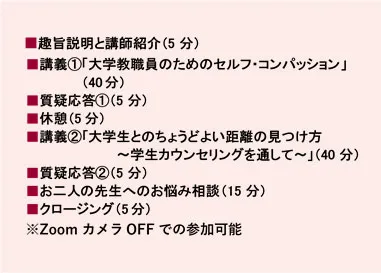
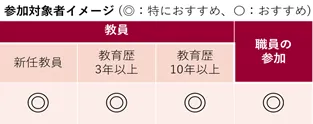
■ Part 2: How to write an application to obtain research funding – Learn tips and strategies
- schedule:
- Wednesday, July 2, 2025, 6:00 PM – 8:00 PM
*End time may change depending on progress. - Event format:
- Lecture (using Zoom)
- Capacity:
- No limit on the number of participants (we look forward to your participation).
- Progress:
- Ikuko Takao (Assistant Professor, Student Training Support Center, Kyoto Pharmaceutical University)
Masaaki Ohata (Lecturer, Faculty of Bio-Environment, Kyoto University of Advanced Science) - Lecturer:
- Yoshinori Sato (Professor, Department of Psychology, Faculty of Humanities, Kyoto University of Advanced Science)
Yoko Matsubara (Specially Appointed Professor, Graduate School of Core Ethics and Frontier Sciences, Ritsumeikan University)
Kakenhi (Grants-in-Aid for Scientific Research) is the most common form of research funding for Japanese researchers and an important source of funding for the significant advancement of research based on researchers’ original ideas. However, obtaining this funding is not easy. This training will feature a guest lecturer who has experience in being selected for Kakenhi and serving as a reviewer. He will share tips and mindsets for preparing applications for successful Kakenhi applications. He will also discuss key points and strategies for attempting to obtain larger-scale funding, such as Grants-in-Aid for Scientific Research (S), (A), and (B). Following a positive response to the previous year’s event, we are holding this training again this year. This is a great opportunity to receive specific advice on preparing Kakenhi applications and learn strategies for success. We hope you will join us.
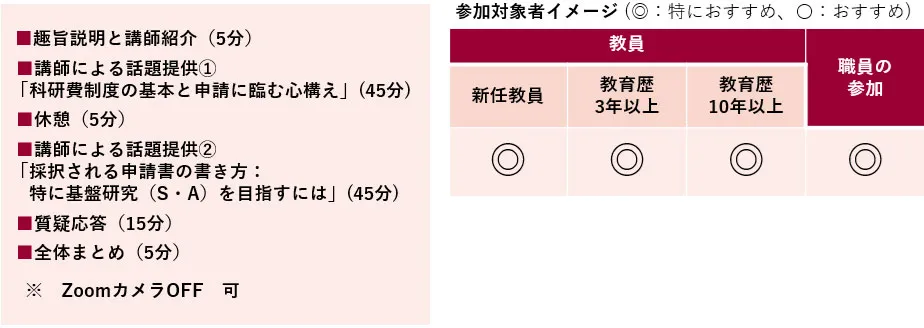
■ Part 3: What’s the seminar next door like?
- schedule:
- Friday, September 26, 2025, 18:30-20:30
*End time may change depending on progress. - Event format:
- Lecture (using Zoom)
- Capacity:
- No limit on the number of participants (we look forward to your participation).
- Progress:
- Toshiya Kayaki (Professor, Faculty of Business Administration, Ryukoku University)
Woo-jong Jeong (Associate Professor, Faculty of International Studies, Otani University) - Lecturer:
- Takeshi Fukao (Professor, Faculty of Advanced Science and Engineering, Ryukoku University)
Kenichi Yasuoka (Associate Professor, Graduate School of Humanities, Osaka University)
What kind of seminars are run in other fields? We will provide an opportunity to learn about ways to make seminar and laboratory management more fruitful. We will
invite one lecturer each from the natural sciences and social sciences to introduce the practices and innovations of seminar management in different fields.
Afterwards, participants will join in and share information about their respective seminar management practices. We will also hold a panel discussion based on the concerns and challenges participants face, with the aim of gaining new insights. Finally, there will be time to summarize and widely share the knowledge gained. Through
this training, we hope participants will connect with each other across disciplines and take home hints that can be used in running their seminars and laboratories from now on.
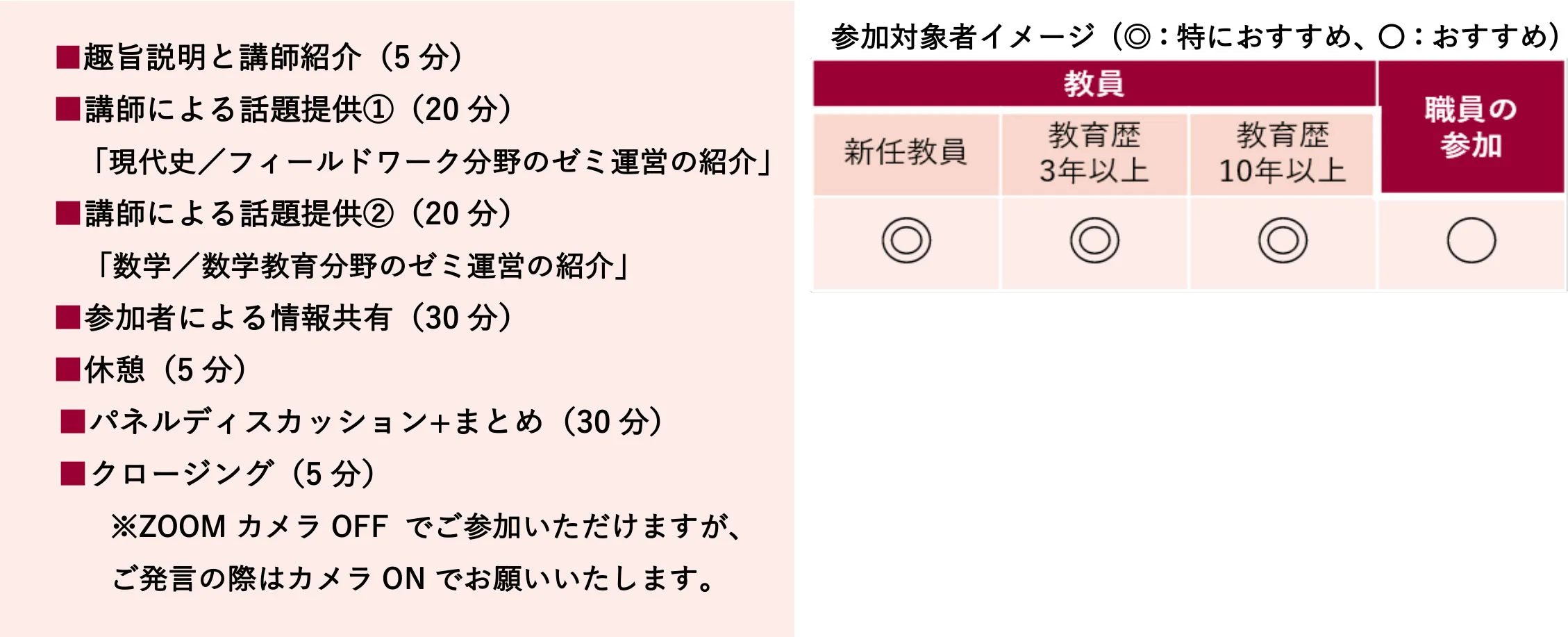
■ Part 4: Have fun while you improve! Improve your vocabulary and intellectual writing skills through games
- schedule:
- Saturday, December 13, 2025, 1:30 PM – 3:50 PM
*End time may change depending on progress. - Event format:
- Lecture + Game (using Zoom)
- Capacity:
- No limit on the number of participants (we look forward to your participation).
- Progress:
- Kanae Akaiwa (Associate Professor, Faculty of Information Science and Technology, Kyoto Sangyo University)
Akiko Nojima (Associate Professor, Faculty of Child Education, Heian Jogakuin University) - Lecturer:
- Andy Nonaka (Representative Director, Communication Skills Association)
In recent years, students’ lack of vocabulary and monotonous expressions have been identified as issues in many educational settings. In particular, how to foster the “intelligent and sophisticated language” required for public settings, such as presentations, reports, and job application forms, has become an important theme in university education.
In this training, an instructor with experience implementing “vocabulary-building activities through games” in online courses and classes will introduce effective vocabulary learning methods based on public speaking research and educational practice. Participants will also gain hands-on experience designing game-based learning methods that allow students to expand their vocabulary while having fun, as well as methods to support intelligent language expression that can be used in teaching presentations and reports. Whether you’re concerned about
issues with students’ presentations and writing, want to incorporate independent learning into your classes, or want to support students in improving their expressiveness in career education or job hunting guidance, this training is packed with tips for creating lessons and supporting students.
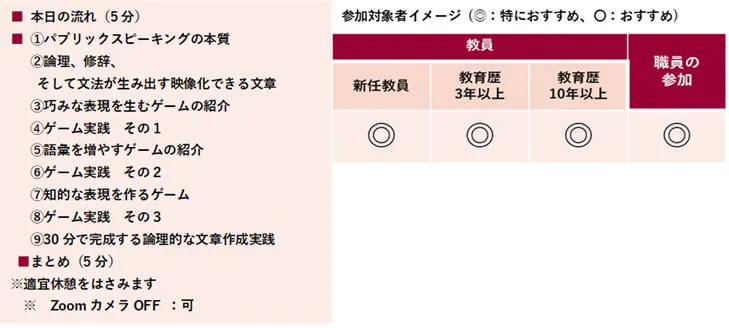
Implementation Report
[Number of participants here▶]
Contact Information
Consortium of Universities Kyoto, Public Interest Foundation, FD Projects,
TEL: 075-353-9163, FAX: 075-353-9101,
Campus Plaza Kyoto, Nishinotoin-dori Shiokoji-sagaru, Shimogyo-ku, Kyoto 600-8216
*Reception hours: Tuesday to Saturday, 9:00-17:00 (excluding New Year’s holidays)

















